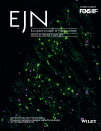 The European Journal of Neuroscience has pulled a paper after learning that one author’s name had been included without his consent.
The European Journal of Neuroscience has pulled a paper after learning that one author’s name had been included without his consent.
Co-editor-in-chief of the journal, Paul Bolam, told us that the Shandong University of Medicine in China (where the work was carried out) conducted an investigation and found “a serious case of academic misconduct” — one author had forged the signature of another researcher, in order to add him as a co-author on a project in which he had not participated.
Here’s the retraction notice, which tells us a bit more:
The above article from European Journal of Neuroscience, published online on 5 March 2013 in Wiley Online Library (http://onlinelibrary.wiley.com/doi/10.1111/ejn.12162/full), has been retracted by agreement between the Editors-in-Chief, Paul Bolam and John Foxe, the authors and John Wiley & Sons Ltd. The retraction has been agreed as Dr Phillip Barber has informed the publisher that he had seen neither the original data nor any version of the manuscript, and had not been involved in the work reported. A subsequent Institutional investigation found evidence of misconduct on the part of the submitting author.
The paper, “A dietary polyphenol resveratrol acts to provide neuroprotection in recurrent stroke models by regulating AMPK and SIRT1 signaling, thereby reducing energy requirements during ischemia,” has been cited 19 times, according to Thomson Reuters Web of Science.
Bolam, an emeritus professor and senior scientist at the University of Oxford, UK, explained the situation to us:
Dr Barber contacted us to say that he had not been involved with the paper at all (he first saw it when it popped up in a Medline search). The lead author, Li-Mei Wang, apparently instructed the submitting author to include Dr Barber on the author list “because several new methods and techniques in this paper were developed in Dr. Barber’s lab.”
It turned out that the submitting author, Yongjiu Wang, had falsified Dr Barber’s signature on the documentation. The matter was investigated by the Institution where the work was carried out (Shandong University School of Medicine), and they concluded that there had been a serious case of academic misconduct. As such, the decision was made to retract the paper.
We’ve reached out to co-authors Li-Mei Wang and Zhe-Yu Chen, as well as Shandong University for a comment. We’ve also contacted Philip Barber, who is based at the University of Calgary in Canada. We’ll update the post with anything else we learn.
Hat Tip: Rolf Degen
Like Retraction Watch? Consider making a tax-deductible contribution to support our growth. You can also follow us on Twitter, like us on Facebook, add us to your RSS reader, sign up on our homepage for an email every time there’s a new post, or subscribe to our new daily digest. Click here to review our Comments Policy. For a sneak peek at what we’re working on, click here.
Alas, forging a signature is a crime not research misconduct, as is failure of the non-contributing authors to contact editors and report forgery as soon as the act is brought to their attention!
I have come across many similar incidents, where the names of non-contributing authors are included in the list of authors, with or without consent. The question is can those authors verify the reported findings? What will their position be when fraud is detected?